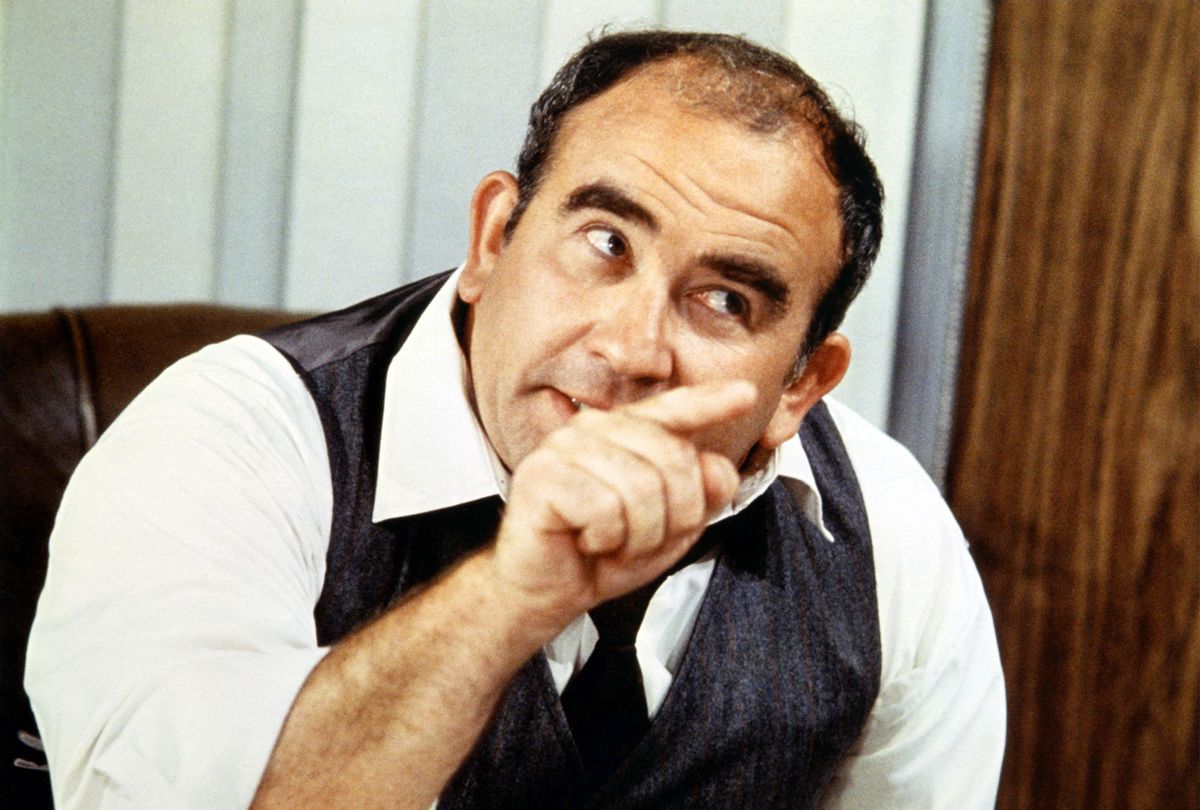It's hard to think of a more universally beloved curmudgeon than Ed Asner, who died on Sunday at 91. From his early work in Chicago's legendary improv scene in the 1950s to his 2003 take on Santa Claus in "Elf" and his soaring 2009 performance in "Up," Asner played the role of a hard-boiled-but-soft-hearted crank to perfection. Offscreen, he was equally full of gruff empathy, devoting himself to a life of advocacy for the vulnerable: everyone from artists to immigrants to laborers to Holocaust survivors. It was onscreen, though, that he did his most creative work to repair the world, establishing — with his legendary character Lou Grant — a cultural archetype that defined a sitcom generation.
In his 2002 book "The Haunted Smile," historian of comedy Lawrence Epstein coined a phrase that defines that archetype expertly: "secular rabbi." Full of tough love and gentle wisdom, secular rabbis — a sitcom staple since the 1970s — preside over a cast of zany, misfit, insecure characters and step in at crucial moments to offer moral guidance, encouragement, and sometimes a good joke to break the tension. The actors who play them are typically, but not always, Jewish. (Asner's parents were Orthodox Jews who immigrated to the U.S. from Russia and Lithuania.) The characters themselves are almost always coded as Jewish, too, but rarely referred to explicitly as Members of the Tribe.
Want a daily wrap-up of all the news and commentary Salon has to offer? Subscribe to our morning newsletter, Crash Course.
Asner's Lou Grant character was one of the first secular rabbis in television history. Grant, who debuted on "The Mary Tyler Moore Show" in 1970, was the director of a nightly news broadcast: a crusty Midwesterner in the mold of Studs Terkel or Mike Royko. In the pilot episode, he hires Mary Richards — a plucky, independent, but guileless woman — as his associate producer, thrusting her into the cutthroat world of television journalism. Grant believed in her talent, and he gave her responsibilities few women were given at the time. He stood behind Mary whenever she got overwhelmed or succumbed to self-doubt. Beneath his irascible exterior, Grant was part mensch, part feminist male ally.
Asner's character resonated so strongly with audiences that when The Mary Tyler Moore Show finished its remarkable seven-year run — having given rise along the way to two notable spin-offs featuring Mary's best friends, Rhoda and Phyllis — Lou Grant became one of the first hour-long dramas in television history to be spun off from a sitcom.
No longer surrounded by a television newsroom full of eccentrics, Grant transformed into a stern, wise newspaper editor who stood for truth and justice in a world that expected moral compromise. He guided his pool of reporters through thorny ethical questions as they wrote about pressing social issues. The appeal of the show hung on Grant's humanness . . . or, to use the appropriate Jewish term, his Menschlichkeit.
Between "The Mary Tyler Moore Show" and his own program, Asner won five of his seven primetime Emmy Awards — more than any other male actor — for his portrayal of Grant. (The others were for standout performances in two legendary miniseries: "Roots" and "Rich Man, Poor Man.") All told, Asner's character was a huge hit for more than a decade.
Lou Grant also set the standard for a generation of sitcom secular rabbis that followed. James L. Brooks, who co-created "The Mary Tyler Moore Show," cast Judd Hirsch in a similar role as Alex Rieger on "Taxi." Rieger was an astute observer of human nature who helped a garage full of cab drivers with big dreams cope with their even bigger failures. The 1970s and 1980s saw (among others) Hal Linden playing a patient, caring precinct captain leading a motley crew of detectives on "Barney Miller"; Gabe Kaplan as a playful, warm-hearted educator who returned to his old neighborhood to teach remedial students in "Welcome Back, Kotter"; and Allan Arbus as soft-spoken psychologist Sidney Freedman keeping a madcap group of military doctors from falling apart on "M*A*S*H."
After a cohort of loud-and-proud comedians like Lenny Bruce and Mel Brooks, who worked tirelessly to make Jewishness part of mainstream American culture, this new generation of characters (and the writers who created them) worked covertly to achieve the opposite transformation, making America more Jewish instead. Collectively, they helped smuggle Menschlichkeit — under the cover of the sitcom — into the broader American culture. By the late 1980s, though, the archetype had clearly run its course. Producers abandoned Baby Boomer ideals and optimism in favor of Gen X disillusionment and cynicism.
When "Lou Grant" was canceled after five critically acclaimed years, many observers, including Asner himself, wondered whether politics were to blame. A lifelong progressive, Asner was a member of the Democratic Socialists of America. Through his work with a variety of non-profit organizations, he fought for free speech, single-payer health care, wildlife conservation, and support for undocumented migrants, among many other causes. He also served two terms as president of the Screen Actors Guild. In real life, Ed Asner, like Lou Grant, treated matters of truth, justice, and care for those in need with the utmost seriousness and devotion.
So beloved were both the character and the actor that a mere three days before he died, a fan asked Asner, on Twitter, whether it was too late to revisit his most famous character. Is there, in these difficult times, a resurgent need for a mensch like Lou Grant? Is the success of shows like "The Good Place" and "Ted Lasso" an early indication that sitcoms might be ready to embrace earnestness and emotional intelligence again? Ever a secular rabbi, Asner offered the fan a little bit of comfort and optimism: "Never too late," he answered. Sadly, it was.



Shares